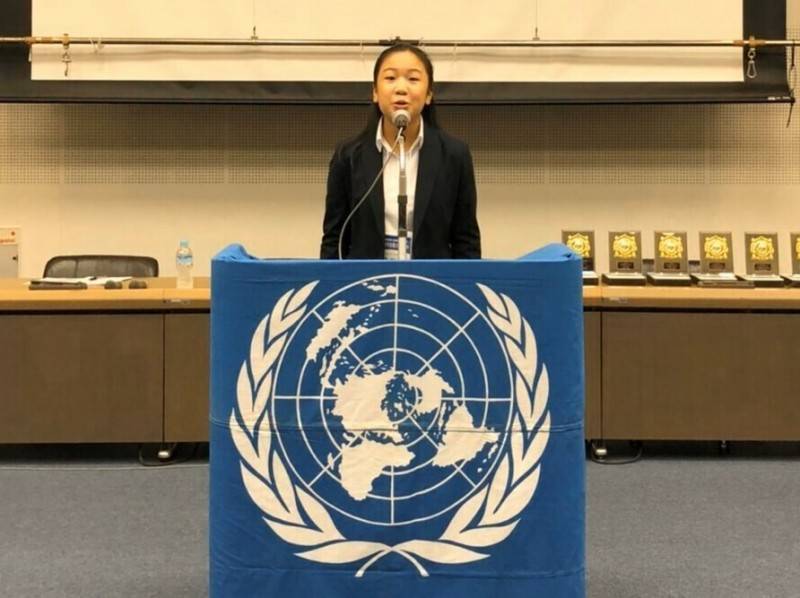 Yun-Tzu leads the international cooperation team at Climate Youth Japan as its first high school member。
Yun-Tzu leads the international cooperation team at Climate Youth Japan as its first high school member。
Yun-Tzu (Allison) Lin 林昀諮
Last year, wildfires ravaged rainforests from Australia to the Amazon.
Last month, extreme heat waves swept across the American Northwest.
Just last/this week, record rainfall unleashed destructive floods across Western Europe.
Rising temperatures have fueled the number and intensity of natural disasters we face. Still, climatechange is but one of the existential crises threatening our future.
In January, the Bulletin of Atomic Scientists unveiled their iconic Doomsday Clock for 2021. Due tothe twin threats of climate change and nuclear weapons, the clock signals 100 seconds to midnight,or doomsday. Humanity is the closest we’ve been to self-destruction since the clock’s creation in
1947. The clock warns against complacency as both the natural world and nuclear peace deteriorateunderneath our hands by day.
First, the cascading effects of climate change are exacerbating humanitarian issues from famine toepidemics to hit the least prosperous demographics the hardest. Researchers and global agreementsstress a 1.5°C rise in temperature from pre-industrial levels as the alarming threshold where our
climate’s dire state will drop from redeemable to irreversible. Under current emission trends, the UNIPCC predicts we will reach that inflection point somewhere between 2030 and 2052.
Next, the first deployment of nuclear weapons 75 years ago obliterated two cities, killed hundreds ofthousands instantly, and scarred generations to come with the lasting effects of radiation. Since then,attempts at nuclear disarmament have reduced the quantity, but not the sophistication or lethality ofnuclear weapons. A single deployment today, accidental or otherwise, would unleash hundreds of millions of instant casualties and a nuclear winter spanning decades. Alarmingly, history reveals several near misses, where governments avoided nuclear use by happenstance.
Climate change that will devastate the planet is underway. A nuclear war that would end civilizationis a real possibility. Yet, both crises continue to feed on human denial and inaction. On the large scale, we cling to the capabilities and modes of thinking that created these threats in the first place.Man-made problems mandate man-made solutions. Thus, the question confronting us transforms from “why should I get involved?” to “why am I not?”
Understandably, it is difficult to reconcile the sheer magnitude of these problems with you and me.For instance, I am 16 years old right now. Society has clothed me, fed me, and educated me over the past decade and a half while I contributed practically nothing in return. What gives me the audacity
or the ability to demand society to change? This is precisely one of the biggest misconceptions I’ve come across - that young people don’t have the power to involve themselves.
I attended my first Fridays For Future climate strike with a few friends in September 2019. By the end of the strike, my poster was crumpled, my backpack was ripped, and my throat was hoarse. Yet,this exhausting strike was the first drop that sent ripples through me. I was inspired to research this issue that had five hundred young people around me, and millions more around the world, give up a Friday afternoon for.
I resolved to initiate a local FFF chapter. We started by standing on the streets on Fridays. Armed with signs and banners, we asked people passing by if they knew that new coal-fired power plants were under construction 20 minutes from where we stood. We distributed pamphlets at eco-friendly
stores, hosted documentary screenings, and organized more strikes. These efforts were akin to rolling a snowball, as we attracted more interest and participants. In a matter of months, this provided us with the platform to engage directly with policymakers. We met with the city mayor and the
Japanese Minister of Environment to request stronger climate-change policies.
When powerful figures make decisions that hinder my generation’s right to a fair and sustainable world, youth grassroots movements like mine respond. We respond with strikes, lawsuits, petitions,social media, and more to force these questionable decisions into the spotlight. The youth are more
than just children, students, or bystanders. From LGBTQ+ to democratic rights, we have always wielded tremendous social and political influence when we coalesced our efforts. The same can be true for these existential threats.
I used to hold a linear view of the next stages of my life: study hard to attain good schools which shall beget a good career and a good life. It is a straightforward mantra, one I see mirrored in the daily life of my peers. As we dedicate thousands of hours towards entrance exams, college
applications, and a future that appears to brim with hope and opportunity, doesn’t it make sense to spend even a fraction of that time considering and acting on existential threats to this future? After all, while the Doomsday Clock may be metaphorical, threats like climate change and nuclear
weapons are not. You and I have the responsibility and, more importantly, the power to turn back the Clock.
Author Yun-Tzu leads the international cooperation team at Climate Youth Japan as its first high school member. She worked as a 2020-2021 High School Peace Ambassador in Japan. She is one of three award winners in the Stanford e-Japan program for her research paper on nuclear deterrence. She is
the recipient of the 2021 Zonta International Young Women in Public Affairs Award in Japan.
You can contact Yun-Tzu at allison.ytlin@gmail.com
